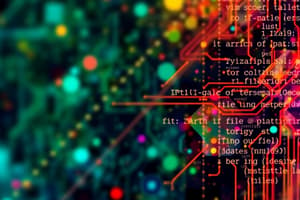Podcast
Questions and Answers
What is the core component of an operating system responsible for managing resource allocation and scheduling processes?
What is the core component of an operating system responsible for managing resource allocation and scheduling processes?
Which part of an operating system allows files to be organized hierarchically by name and maintained on storage devices?
Which part of an operating system allows files to be organized hierarchically by name and maintained on storage devices?
What is the responsibility of the kernel in an operating system regarding devices?
What is the responsibility of the kernel in an operating system regarding devices?
Which component of an operating system is responsible for individual instances of running software?
Which component of an operating system is responsible for individual instances of running software?
Signup and view all the answers
What type of services does the kernel provide in an operating system?
What type of services does the kernel provide in an operating system?
Signup and view all the answers
Which part of an operating system allows users to access, store, and retrieve files easily on storage devices like hard drives?
Which part of an operating system allows users to access, store, and retrieve files easily on storage devices like hard drives?
Signup and view all the answers
What ensures that every program has access to enough memory when it needs it?
What ensures that every program has access to enough memory when it needs it?
Signup and view all the answers
What serves as an interpreter between devices and the operating system?
What serves as an interpreter between devices and the operating system?
Signup and view all the answers
Which component allows us to do more than one thing at once on our computers?
Which component allows us to do more than one thing at once on our computers?
Signup and view all the answers
What ensures that when launching multiple programs, each gets allocated a portion of memory to execute?
What ensures that when launching multiple programs, each gets allocated a portion of memory to execute?
Signup and view all the answers
Which component dynamically allocates memory based on current requirements in modern operating systems?
Which component dynamically allocates memory based on current requirements in modern operating systems?
Signup and view all the answers
Without ____, peripherals like keyboards, mice, and printers might not communicate effectively with the rest of the computer.
Without ____, peripherals like keyboards, mice, and printers might not communicate effectively with the rest of the computer.
Signup and view all the answers
Study Notes
Operating Systems are complex software systems that manage computer hardware and resources to enable users to perform tasks efficiently. They serve as the interface between the hardware components of a system and its programs and applications. To understand operating systems better, let's delve into some of their major components:
Kernel
The kernel is the core component of an operating system responsible for managing the most fundamental aspects of computing. It handles resource allocation, scheduling processes, managing devices, following commands from user programs, and providing services such as memory management, file systems, and network protocol stacks. Think of it like a conductor who coordinates all the other parts of the orchestra—the CPU, storage, and devices—to produce beautiful music (or efficient computing) without any chaos.
File Systems
File systems are another critical part of operating systems. They allow files to be organized hierarchically by name and maintained on disk drives, CD-ROMs, flash drives, and other storage devices so that they can be accessed, stored, and retrieved easily. Picture your desktop with folders neatly arranged; each folder represents a different directory within the file system, while the files inside represent data stored on your hard drive.
Process Management
Processes are individual instances of running software. In terms of operating systems, each program you run is a separate process with its own set of instructions, stack frames, heap, environment variables, etc. When you launch multiple programs simultaneously, each gets allocated a portion of memory to execute. This concept lies at the heart of multitasking and allows us to do more than one thing at once on our computers!
Memory Management
Memory management ensures that every program has access to enough memory when it needs it. If there isn't enough free space left, the operating system takes care of moving unused portions around so that everything still fits. Imagine if this didn't happen: You might only have room for two words at a time! Modern operating systems dynamically allocate memory based on how much is needed right now.
Device Drivers
Device drivers act as interpreters between devices and the operating system. They work with various types of input and output devices such as keyboards, mice, displays, printers, disks, and networks so that all these different types of peripherals can communicate effectively with the rest of the computer. Without them, our favorite mouse might not know what to do, or our printer could get stuck trying to print gibberish because it doesn't understand the codes coming from our computer.
In summary, these interwoven components make up the fabric of modern operating systems. Each serves its purpose diligently, ensuring seamless communication among software, hardware, and users alike.
Studying That Suits You
Use AI to generate personalized quizzes and flashcards to suit your learning preferences.
Description
Test your knowledge of the major components of operating systems such as the kernel, file systems, process management, memory management, and device drivers. Learn how these components work together to facilitate efficient computer operation and seamless communication between software, hardware, and users.




